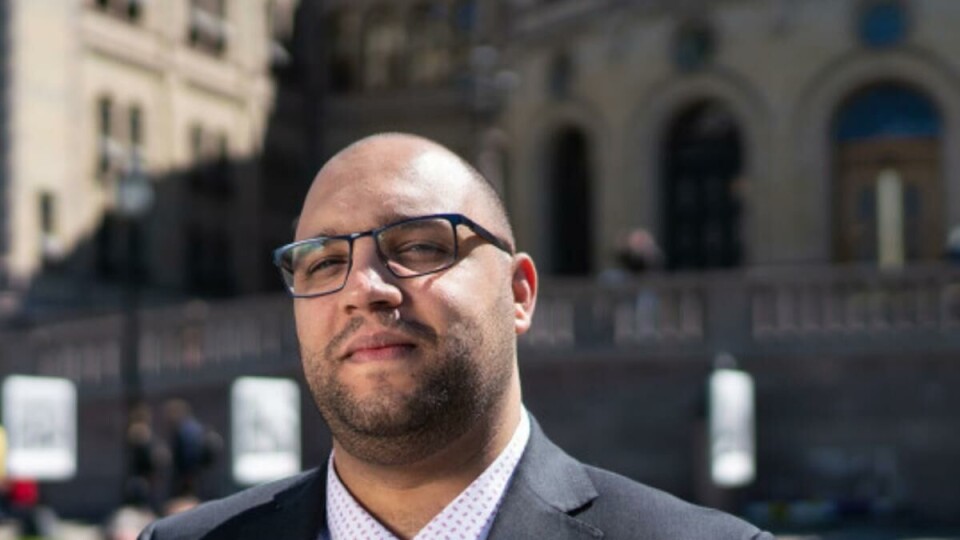
Is Norway heading towards a future with tuition fees?
Høyre, the leading party in Norway’s current government, have suggested an introduction of tuition fees for non-EEA students in Norway. Who would be most affected by such a change, and is it likely to occur anytime soon?
— I probably wouldn’t have come to Norway to study if I had to pay tuition fees. Only if there was a scholarship available, says Taskin Islam (23).
Islam has just begun a master’s degree in informatics at the University of Oslo. He is from Bangladesh and is one of the international students who would have to pay to study in Norway, if a proposal from Høyre were to become reality.
Høyre put forth the first draft of their new party program in September, in which they suggest introducing a tuition fee for international students from outside the EEA and Switzerland studying in Norway. The first draft is currently being debated within the party. The final draft will be presented in January 2021 and the party program will be finalized at Høyre’s national convention in March 2021.
No fees and higher quality
Islam applied to, and was accepted at, several other European universities. He chose to go to Norway partly because there were no tuition fees and partly because current covid restrictions interfered with his visa applications.
He wouldn’t have had to pay tuition fees if he had chosen to study at a public university in Bangladesh. But he also wouldn’t really have been able to pursue his academic ambitions there. He took his bachelor’s degree in Bangladesh and has already noticed big differences between the teaching methods in Norway and Bangladesh.
— Here, the teachers are more practical. They encourage students to solve problems in our own way. But in Bangladesh the teachers just come to the class, go through the topic and that’s it, no analytical reasoning or stuff like that, says Islam.
Many of these students are struggling to meet the demands of high visa financial requirements as it is
Concerns about equal access
The first draft of Høyre’s party program and their suggestion to introduce tuition fees for non-EEA students has sparked some debate. It prompted both Norsk Studentorganisasjon (NSO) and their partner organization the International Students’ Union of Norway (ISU), to criticize Høyre’s proposal.
Both organizations believe that the proposal would go against the Norwegian ‘gratisprinsipp’ which ensures free education for all. The National President of ISU, Amine Fquihi, elaborates on ISU’s position in an email to Inter Universitas.
— Høyre state in the first draft of their party program that their goal is to «continue to ensure equal access and the right to higher education,» but at the same time they remove their commitment to the principle of free higher education for all, Fquihi writes.
— As a first step away from the free principle, they announced their intent to introduce tuition fees for international students from outside of the EEA and Switzerland.
— Which international students would be affected most, and how?
— Tuition fees would have a direct impact on students with poorer economic backgrounds who come from the global south and other non-EEA countries. Many of these students are struggling to meet the demands of high visa financial requirements as it is. Adding tuition fees on top of that would completely prevent them from being able to study in Norway.

Believes it would also impact Norwegians
According to Fquihi, several international students have expressed concerns to ISU about tuition fees since «such a policy would have a drastic impact on their lives and livelihood».
— Many international students fear that the introduction of tuition fees would prevent them from being able to complete their degrees because of their inability to meet the financial demands that this would bring, writes Fquihi.
Fquihi also expresses concern about how an introduction of tuition fees for non-EEA students might impact Norwegian students.
— Internationalization is an important tool, especially in our global age, for training a future workforce that has an international perspective, writes Fquihi.
He believes Norwegian students might end up lacking international exposure if tuition fees are introduced because fewer international students would be coming to study in Norway.
Fquihi also thinks that introducing tuition fees for international students would only be the first step towards introducing tuition fees for all students, including Norwegians.
Høyre: No first step towards student fees for all
Responding to Fquihi’s statements in an email to Inter Universitas, parliamentary representative for Høyre, Marianne Synnes Emblemsvåg, comments that this is only the first draft of Høyre’s party program. Emblemsvåg rejects the claim that introducing tuition fees for non-EEA students will eventually lead to tuition fees for all.
— We will continue to ensure equal access and the right to higher education, no doubt about that. The government wants students to study abroad, as stated in the government’s new strategy «A world of possibilities – international student mobility in higher education», and international students to study in Norway, writes Emblemsvåg.
— If the suggestion to introduce tuition fees for international students from outside of the EEA and Switzerland should be approved by Høyre, one would naturally evaluate how this will affect students from different backgrounds.
Emblemsvåg adds that measures such as waivers or scholarships for talented students might be considered in Norway, if tuition fees for non-EEA students were to be introduced.
We will continue to ensure equal access and the right to higher education, no doubt about that
— Fair
In an email to Inter Universitas, Sandra Bruflot, member of Høyre's program committee, writes that a moderate fee for international students from outside the EEA-area does not go against 'gratisprinsippet'.
— We find the introduction of a moderate fee for international students from outside the EEA-area to be fair, but it is important to emphasize that we are still committed to programs such as «Students at Risk», Bruflot writes.
— We believe that the impact on international students deciding to study in Norway will be minimal. One might of course expect a small decrease following the introduction, but we expect that to even out over time.

Are changes coming?
The principle of free education is central to the Norwegian educational system. In this context, is the government likely to be able to introduce tuition fees for non-EEA students? On the phone with Inter Universitas, Peter Maassen, professor at the Department of Education at UiO, clarifies that the principle of free education doesn't mean that Norwegian education is completely free.
— We do have private higher education institutions in Norway, and, for example, a ‘semesteravgift’ students in public institutions pay. So, it’s not the reality that Norwegian higher education is completely free for all students, says Maassen.
— However, ‘gratisprinsippet’ is still clear, because, apart from the private higher education institutions, the students in public Norwegian higher education don’t pay a formal tuition fee.
Maassen also points out the similarities and differences between the Norwegian system and other Nordic countries. In other Nordic countries only non-EU/EEA students pay tuition fees. So, the continuation of free education for national and, consequently also EU/EEA students, is very strong in the Nordic countries in general.
— So, the difference between the other Nordic countries and Norway is the issue of tuition fees for non-EU/EEA students?
— Yes, and the nature of private higher education.
— Denmark, for example, doesn’t have private universities. So in that sense you can say that part of the reason Norway still can have free higher education is because part of higher education is private and charges tuition fees.
I don’t expect that there will be a majority in the political system for introducing tuition fees for non-EU/EEA students anytime soon
Four positions
— Do you see a political momentum for introducing tuition fees for non-EU/EEA students in the near future?
— No, definitely not. There are four basic positions on this matter. The first two are in favor of continuing not charging tuition fees, says Maassen.
He explains that the first is a principled position; sticking to ‘gratisprinsippet’, because of a worry that if Norway was to introduce tuition fees for non-EU/EEA students, it would in the end lead to tuition fees being introduced for Norwegian students. The second argument is the idea that Norway needs to import talents, and that student fees would make Norwegian higher education less attractive.
The third position is according to Maassen that it may be considered unfair that Norwegian taxpayers have to pay part of the costs for higher education for students from countries with student fees.
The fourth and final position is that other countries are introducing tuition fees for non-EU students and Norway cannot ‘stay behind’. This could also mean that introduction of student fees would not have a negative impact on the attractiveness of Norwegian higher education because everyone else is doing it.
— In addition, Norwegian higher education institutions would miss an important source of additional income, creating unfair competition with non-Norwegian institutions, Maassen adds.
According to Maassen, these four positions have «in various combinations dominated the Norwegian discussion about the issue of tuition fees». However, the first two about ‘gratisprinsippet’ and ‘kloke hoder’ have so far been dominant.
— So, I don’t expect that there will be a majority in the political system for introducing tuition fees for non-EU/EEA students anytime soon.































